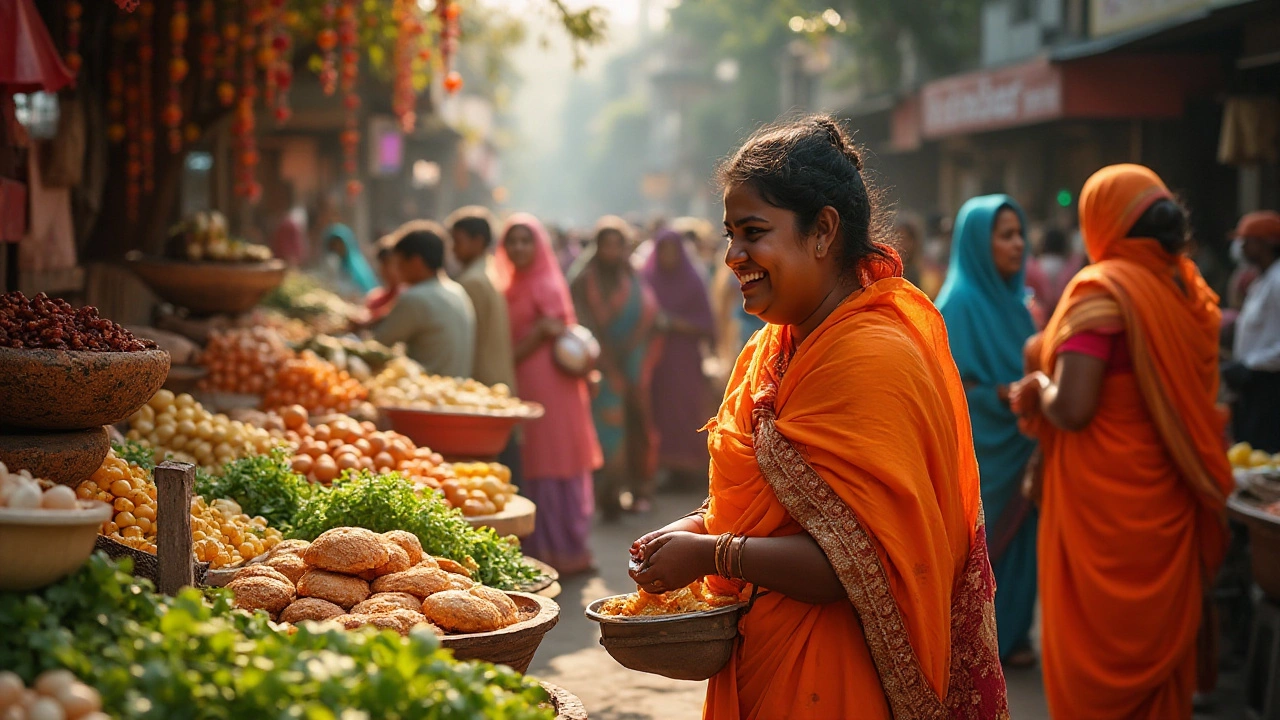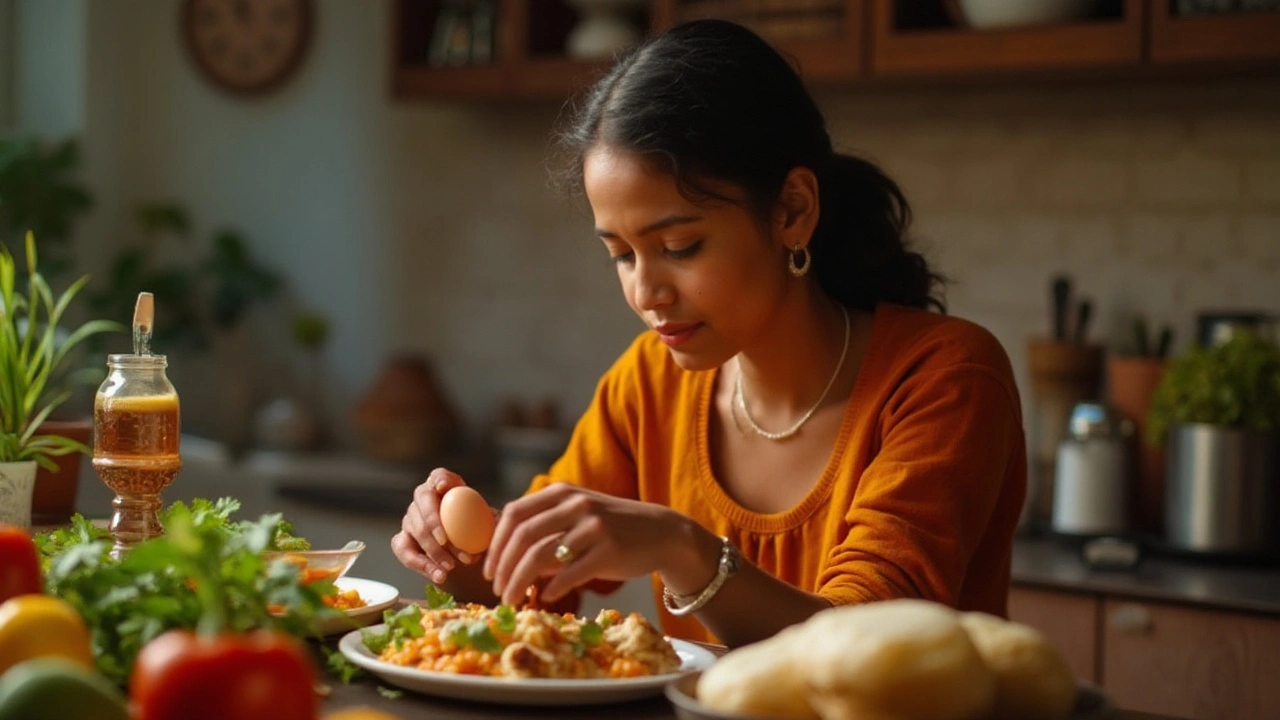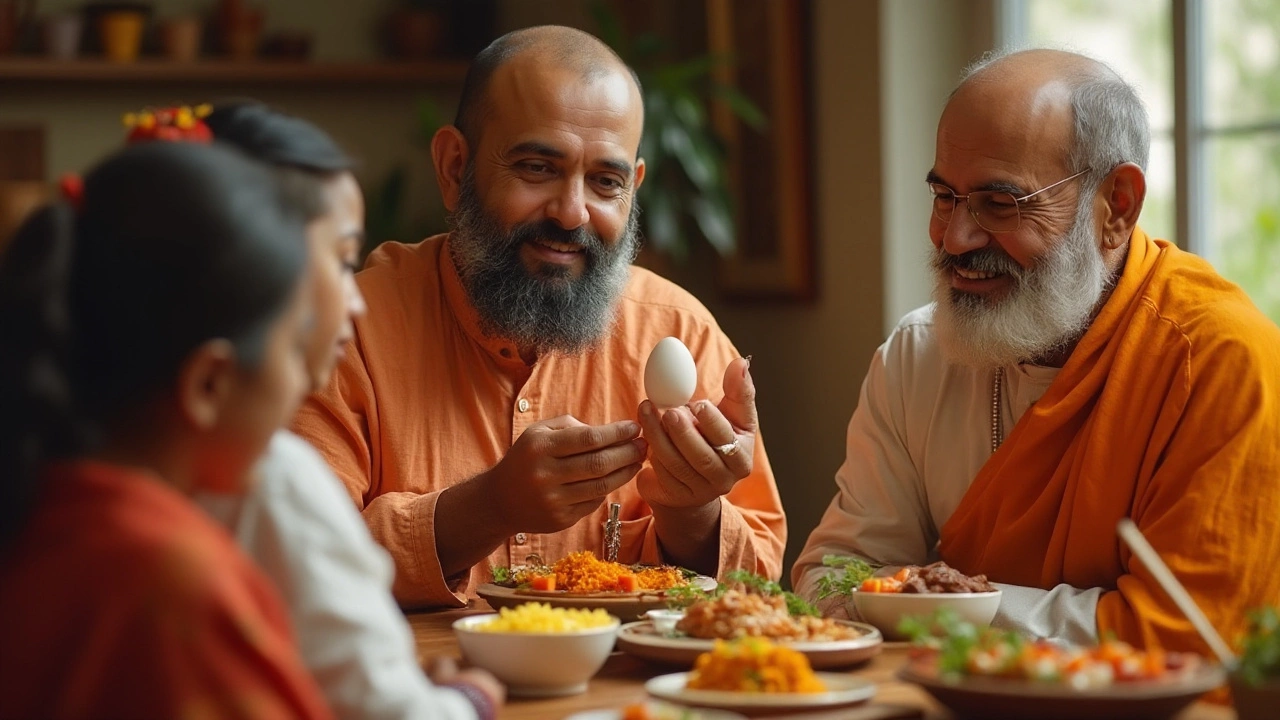Indian cuisine is rich and diverse, often defined by the vibrant array of spices, textures, and flavors. Within this culinary tapestry lies a significant section dedicated to vegetarian traditions. However, the question of whether eggs have a place in these vegetarian diets often arises, sparking debate and varied interpretations.
In India, the term 'vegetarian' has nuanced meanings, often influenced by religious beliefs, cultural traditions, and health considerations. While many vegetarians in India strictly avoid all forms of meat, the inclusion of eggs can be a contentious topic. Some identify as ovo-vegetarians, who consume eggs while abstaining from other animal products, embracing the culinary flexibility they offer. Others follow a more traditional vegetarian path, avoiding eggs due to ethical or spiritual reasons.
To navigate these intricate dietary customs, it is essential to understand the diverse perspectives across different Indian communities. This exploration not only sheds light on the individual choices regarding eggs but also provides insight into the broader spectrum of vegetarian dishes that make Indian cuisine so unique and cherished.
- Understanding Indian Vegetarianism
- Cultural and Religious Influences
- The Role of Eggs in Vegetarian Diets
- Popular Vegetarian Dishes in India
- Navigating Dietary Choices
Understanding Indian Vegetarianism
To truly grasp the essence of vegetarianism in India, one must first acknowledge the historical, spiritual, and cultural threads that have woven this dietary preference into the daily lives of millions. India, home to a multitude of religions, such as Hinduism, Jainism, and Buddhism, intrinsically ties food choices to religious practices and moral philosophies. In these communities, the term 'vegetarian' often refers to an individual who abstains from consuming any animal flesh, including meat, poultry, and fish, adhering to a diet that's primarily plant-based.
The advent of vegetarianism in India can largely be traced back to ancient texts such as the Vedas and the teachings of Lord Mahavira and Gautama Buddha, which emphasize non-violence or 'ahimsa.' This principle advocates for minimizing harm to all living beings, thus encouraging a meat-free lifestyle. However, the interpretation of what constitutes a vegetarian can vary significantly across different regions and communities within India. Some communities, influenced by western ovo-lacto vegetarian diets, include dairy and eggs, blurring the lines of traditional vegetarianism.
Interestingly, vegetarianism in India is not solely a product of religious adherence. Economic factors also play a pivotal role. In many rural areas, meat is often considered a luxury due to its cost, making a vegetarian diet a more economically viable choice. Additionally, the widespread availability of fresh produce and legumes, such as lentils, peas, and a variety of beans, contributes to the rich tapestry of vegetarian culinary arts. The integration of these ingredients into diverse dishes has led to the popularity of vegetarian Indian dishes worldwide.
The prevalence of vegetarianism in India is illustrated in the demographics. According to recent surveys, approximately 30% to 40% of India's population identifies as vegetarian, with higher concentrations in states like Gujarat and Rajasthan. Nevertheless, within these broad figures lies a complex spectrum of dietary preferences. From lacto-vegetarians, who consume dairy products but not eggs, to stricter vegan practices, the diversity of Indian vegetarianism is vast and deeply personal. This variability demands a nuanced understanding of labels when engaging with Indian vegetarians.
"Vegetarianism in India is not just a diet but a way of life, steeped in layers of cultural and spiritual significance," notes renowned food historian, Pushpesh Pant.
Understanding these nuances is crucial for anyone exploring Indian vegetarianism, whether they are crafting a culinary adventure or engaging in academic study. Indian vegetarian cuisine's richness is a testament to human creativity in utilizing available resources while respecting ecological balance and moral values. As Indian vegetarianism continues to evolve, it reflects the dynamic interplay between tradition and modernity, providing an ever-expanding narrative of food, identity, and belief.
Cultural and Religious Influences
Cultural and religious beliefs play a pivotal role in shaping dietary habits in India, making them foundational to understanding whether Indian vegetarians include eggs in their diets. One of the most significant factors is the prevalence of Hinduism, which guides its followers towards vegetarianism, emphasizing ahimsa or non-violence. This principle primarily discourages the consumption of meat as it involves harm to animals. However, the status of eggs presents an area of divergence. In Hinduism, the question of eating eggs is often contingent upon regional practices and individual interpretations of religious texts.
Jainism, another religion with a substantial following in India, mandates a strict vegetarian diet devoid of root vegetables and eggs. For Jains, the practice of ahimsa extends to the unseen, microscopic lives, advocating for an even stricter adherence to a diet that promotes minimal harm to living organisms. On the other hand, Buddhists practice varying degrees of vegetarianism depending on the sect and region, with some consuming eggs and others abstaining completely.
The influence of regional traditions cannot be understated. In parts of South India, like Tamil Nadu, dietary practices are often tied more to culinary tradition than religious edict. Here, vegetarian dishes are rich and varied, but the use of eggs is minimal in traditional breakfasts like idli and dosa. In contrast, the coastal regions, influenced by their access to varied food sources, might see a looser application of these dietary constraints in favor of practicality and nutrition.
"The diversity within Indian vegetarianism reflects the complexity of its cultural fabric, where diet is as much about personal choice as it is about heritage and belief," as noted by culinary historian Dr. Pushpesh Pant.
Interestingly, socioeconomic status can also influence dietary choices. In urban centers with a more cosmopolitan lifestyle, dietary customs might evolve with global exposure, where younger Indians adopt ovo-vegetarianism for health or convenience. Here, eggs are often seen as an acceptable protein source. Schools may also include eggs in mid-day meals addressing nutritional needs, further influencing perceptions of their acceptability.
These diverse cultural and religious landscapes highlight the varied approaches within vegetarian Indian dishes, offering a glimpse into the nuanced decision-making that Indian vegetarians engage in. The emphasis on eggs—whether included or excluded—reflects a dynamic interplay of tradition, individual choice, and modernity. Recognizing these influences helps appreciate the broader picture of dietary habits across this diverse nation, providing insights into why some Indian vegetarians eat eggs, while many do not.

The Role of Eggs in Vegetarian Diets
The role of eggs in vegetarian diets has always been a fascinating discussion, particularly within the diverse culinary landscape of India. For many, the inclusion of eggs in a vegetarian diet seems paradoxical due to the traditional vegetarian philosophy that generally excludes all sorts of flesh and its derivatives, such as eggs. On one side of the spectrum, we find ovo-vegetarians who embrace eggs for their versatility and nutritional benefits, while maintaining their stance against meat consumption. These individuals see eggs as a valuable source of protein, vitamins, and minerals, often lacking in a strict vegetarian diet. Eggs not only provide essential nutrients such as vitamin B12 and iron but also come packed with high-quality protein, making them a potent addition for vegetarians who are keen to maintain a balanced diet.
On the other end, many traditional Indian vegetarians abstain from consuming eggs due to cultural or religious beliefs, viewing them as embryonic and therefore akin to meat. This perspective is deeply rooted in the practices of religions such as Hinduism, Jainism, and Buddhism, which advocate for ahimsa, or non-violence. In these communities, the dietary choice extends beyond health reasons and delves into ethical and spiritual realms. It's this spiritual outlook that shapes the traditional vegetarian lifestyle observed by numerous Indian households. It's noteworthy how these beliefs manifest in everyday dietary preferences and festive meals, where no eggs or other animal products are used, maintaining the sanctity of their customs.
Eggs' potential to blur the boundaries between vegetarian and non-vegetarian diets in India is notably fascinating. They often play a dual role in households that practice relaxed dietary norms, especially in urban areas. Here, people might incorporate eggs for the ease and diversity they bring into meal preparation, bridging a gap between traditional vegetarianism and contemporary dietary needs. Eggs can transform a simple vegetarian dish into a rich and nourishing meal, offering a much-needed protein boost. Take, for example, the use of eggs in dishes like egg curry or in baking, where they serve as a binding agent. This demonstrates the dynamic nature of Indian vegetarian cuisine, where personal choice harmoniously converges with traditional insights.
"The debate on eggs' place in vegetarian diets is as much about nutritional science as it is about cultural identity and personal belief." - Food Anthropologist, Anika Sharma
As dietary patterns evolve, the role of eggs in vegetarian diets continues to stir conversation across various segments of society in India. While a large portion of the population remains unaffected by this dietary inclusion, choosing to adhere strictly to vegetarian principles, a growing faction appreciates the practicality and benefits that eggs offer. This choice, however, is personal and often revolves around one's upbringing, environment, and nutritional needs. Ultimately, the story of eggs in Indian vegetarian diets is one of adaptation and respect for individual dietary journeys, adding another layer to the rich tapestry of Indian cuisine.
Popular Vegetarian Dishes in India
India's culinary landscape is wondrously diverse, with vegetarian dishes playing a starring role in many regional cuisines. These dishes not only capture the essence of India's rich agricultural bounty but are also a testament to the creativity and skill of its chefs. An everyday staple in many Indian households is Dal Tadka, a comforting and nutritious dish made from yellow lentils cooked with a tempering of spices like cumin and mustard seeds. The simplicity of the lentils paired with the robust flavors of the tarka is a harmonious experience for the palate.
Moving towards North India, Palak Paneer has been winning hearts with its vibrant green hue and creamy texture. This dish is a perfect amalgamation of soft paneer cubes ensconced in a puree of spinach, garnished with garlic and a touch of cream. It's a beloved comfort food that brings the hearty goodness of leafy greens and protein-packed cheese together. Often, it’s enjoyed with unleavened bread like roti or paratha, making it a wholesome meal.
"Vegetarianism in India isn't just a diet; it's a way of life that speaks to the country's cultural and spiritual richness." - The Indian Culinary Gazette
Down in South India, the humble Masala Dosa steals the limelight. This crispy, golden crepe filled with spiced potato and served with coconut chutney and sambar is a breakfast delight that promises crunch, spice, and a burst of tangy flavors. It's a perfect example of how Indian culinary traditions use simple ingredients to create something extraordinary, making it a top pick among Indian vegetarian dishes.
In the Western regions, Gujarati Bhindi stands out as a spicy and tangy preparation using okra. Often cooked with a blend of gram flour and spices, it provides a delightful twist to how okra is typically served. The dish is a reflection of Gujarat's penchant for sweet, sour, and spicy flavors melding in perfect harmony. Pairing it with warmer, softer chapatis elevates its taste, creating a beloved combination among locals and visitors alike.
Lastly, we cannot overlook the delicate and aromatic Vegetable Biryani that reigns in various parts of India. Each grain of rice is infused with fragrant spices and layered with seasonal vegetables, then slow-cooked to perfection. Often adorned with crispy onions and nuts, this dish epitomizes the complex flavors and cooking techniques that Indian cuisine is known for, while remaining entirely plant-based.

Navigating Dietary Choices
Choosing the right diet can be a thoughtful journey, particularly in a country like India, where gastronomic traditions are diverse and deeply interwoven with cultural beliefs. The question of whether to include eggs in a vegetarian diet is not always a straightforward decision. For many, dietary choices are a reflection of personal values, health considerations, and sometimes, religious guidelines. It's crucial to understand these factors to navigate the sometimes-complex landscape of Indian vegetarianism.
Many Indian vegetarians deliberately choose to exclude eggs from their diets due to religious beliefs. Religions like Jainism advocate for a strict vegetarian diet devoid of all animal products, including eggs. Hinduism also plays a significant role, especially among the more orthodox followers, who may view the consumption of eggs as inconsistent with vegetarian principles. Meanwhile, ovo-vegetarians, who include eggs in their diet, might focus on the nutritional benefits, as eggs are a great source of protein, vitamins, and minerals. Nutritionists often recommend eggs as a valuable dietary component for maintaining a well-rounded vegetarian diet.
Today, modern diet trends and global influences encourage a more flexible approach. Younger generations might be more willing to incorporate eggs due to their convenience and versatility. The health-conscious youth are often swayed by the need for high protein sources to supplement their fitness routines. An individual's dietary path can also be influenced by access to information and exposure to diverse cuisines. The rise of social media and online health forums mean more people are making informed decisions about their dietary habits.
"Eggs are one of the most nutritious foods you can find. They contain a little bit of almost every nutrient you need. A single large boiled egg contains Vitamin A, Riboflavin (B2), Folate, Vitamin B12, Phosphorus, Selenium, and decent amounts of Vitamin D, E, K, B6, Calcium and Zinc," shares Ruas Ribeiro, a reputed nutritionist.
Navigating these choices also involves looking at regional variations. In South India, where a diet might include more seafood, eggs are often more accepted. In contrast, the northern parts might adhere more strictly to vegetarian traditions due to religious practices. Understanding these nuances helps in recognizing how vegetarians may approach their dietary regimen differently based on where they're from.
Additionally, there's a growing awareness around ethical eating habits. While traditional vegetarians might oppose eating eggs because they involve animal farming, people are increasingly aware of sustainable and humane farming practices which aim to produce eggs in a more environmentally friendly manner. This awareness can sometimes sway those who were previously on the fence about incorporating eggs into their diet.
